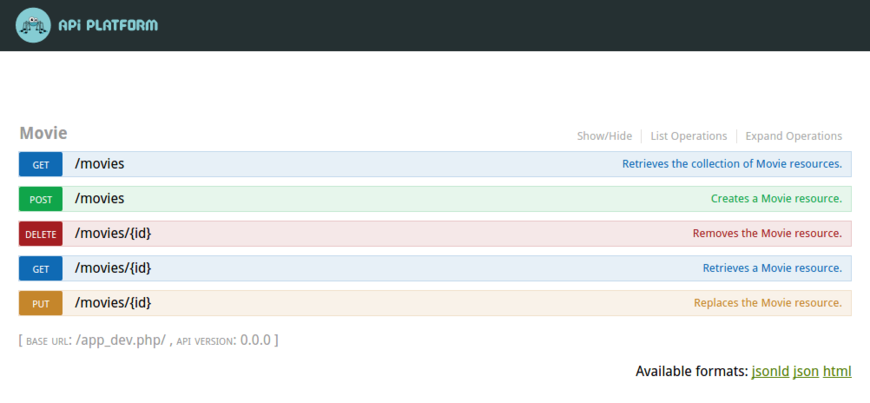
Dependency injection in Symfony
You work with Symfony, but the concept of dependency injection is a little blurry for you? Find out how to take advantage of the component reading this article.

API Platform defines itself as a « PHP framework to build modern web APIs ». Indeed, this tool will help us rapidly build a rich and easily usable API. Why reinvent the wheel? API Platform comes with a bunch of features like an automatic documentation, filters, sorts, and many more.
In this article, we're going to build an API using API Platform, and talk about some of the features that comes with it. I will assume that API platform has already been installed in your project.
We'll create an API around a single resource: movie. Indeed, we will build something that adds, deletes and updates movies.
The first thing we need to do is creating our data model. A movie is made of a title, a release date, actors, a director... Many properties known from everyone. If we go through the documentation, we can see that we can generate our entities with Schema.org. This allows us to use a common language to define our usual resources (Book, Organization, Person…), but it's also understood by search engines like Google or Yahoo.
Good for us, there is a Movie entity from Schema.org, with many interesting properties. For simplicity, we'll only work with some of them.
# app/config/schemas.yml types: Movie: parent: false properties: name: ~ dateCreated: ~ countryOfOrigin: { range: "Text" }
To generate our entity, we only need to execute the following command:
vendor/bin/schema generate-types src/ app/config/schema.yml
Yay! If you go to src/AppBundle/Entity/Movie.php, we get an entity generated automatically that has all kinds of validation according to the types set in Schema.org.
Last but not least, we need to update the database to be able to play with our movie API:
bin/console do:sche:update --force vendor/bin/schema generate-types src/ app/config/schema.yml
 Accessing documentation, you see that the Movie resource is here, with all operations like creating, updating, and deleting.
You can play with the interface and the auto-generated documentation before we go on and see another feature used many times in API: filters.
Accessing documentation, you see that the Movie resource is here, with all operations like creating, updating, and deleting.
You can play with the interface and the auto-generated documentation before we go on and see another feature used many times in API: filters.
Wouldn't it be nice to filter our movies by name, creation date, or any other property? Let's see how we can do that, in a very simple manner.
The first thing is to declare a symfony service detailing the way we want our properties to be filtered:
services: movies.search_filter: parent: 'api_platform.doctrine.orm.search_filter' arguments: [ { id: 'exact', name: 'partial', countryOfOrigin: 'partial' } ] tags: [ { name: 'api_platform.filter', id: 'movies.search_filter' } ]
As you can see, we define for all properties the level of comparison: for the id, we want an exact match (id=5), for the name a partial level, which is a LIKE %name%, and the same thing for our countryOfOrigin. Other levels are available for strings, but not only, you have numeric values, booleans, dates...
Filter management happens automatically with API Platform according to the type (bool, integer…), and it's very easy to filter values using operators <= and others.
services: movies.order_filter: parent: 'api_platform.doctrine.orm.order_filter' arguments: [ { id: ~, name: ~ } ] tags: [ { name: 'api_platform.filter', id: 'movies.order_filter' } ]
Above, we declare a service that allows to sort the fields id and name.
Now that our services are created, we only have to tell our Movie entity to use them:
<?php
/**
* A movie.
*
* @see http://schema.org/Movie Documentation on Schema.org
*
* @ORM\Entity
* @ApiResource(iri="http://schema.org/Movie", attributes={"filters"={"movies.search_filter", "movies.order_filter"}})
*/
class Movie
{
// ...
}You can now query your API with the following URL: movies?name=O&order[name]=desc
Very simple to implement right?
Obviously, you can create your own API Platform filters.
Many other features exist like :
API Platform keeps its promise concerning how fast we can develop an API: creating an API in a few minutes is a child's play!
Developed using best practices, API Platform is easily extensible, which allows everyone to add behaviour.
Finally, the documentation is a very nice thing. You have plenty of examples and explanations.
Version 2.1 of API platform will soon be released, and comes with new features such as: an admin system developed in React, new filters... Details here
Author(s)
Romain Pierlot
Diplomé de l'ISEP en 2013, Romain Pierlot est ingénieur en Etudes et Développement chez Eleven Labs, avec qui il s'amuse comme un petit fou.
You wanna know more about something in particular?
Let's plan a meeting!
Our experts answer all your questions.
Contact usDiscover other content about the same topic

You work with Symfony, but the concept of dependency injection is a little blurry for you? Find out how to take advantage of the component reading this article.

Are you suffering from domain anemia? Let's look at what an anemic domain model is and how things can change.

How to deploy PHP applications to AWS Lambda with Bref